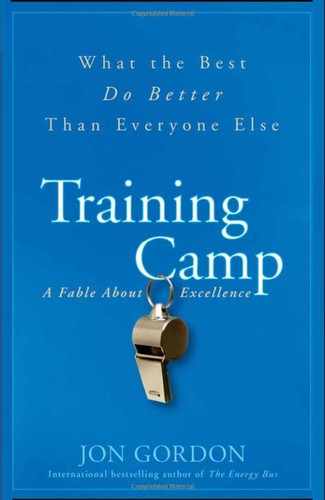
Sully held up his coffee cup and showed Martin. "I have a friend who's an executive at Starbucks. So one day we're talking and I ask him what makes Starbucks so great. I'm expecting him to tell me it's the coffee. But he tells me that it's the fact that they do a hundred things 10 percent better than everyone else. And so I'm saying to myself that this is no different than football or baseball." He turned to Martin. "Do you know the difference between a 250 batter and a 350 batter?"
"I'm guessing it's more than 100 points," Martin said.
"Yes, it's more than a 100 points," Sully said. "A lot more. It's the difference between a Hall of Fame baseball player and an average player. It's the difference between millions of dollars of salary and endorsements. It's the difference between fame and fortune. Yet if you calculate 162 games a year, 4 or 5 bats a game, the difference between a 250 batter and a 350 batter is only 1.7 hits a week. It's the little things that separate the best from the rest. In striving to get better and working hard every day, the best realize that success is not about the big things. Success is all about the little things."
"Great stuff," Coach Ken said as he patted Sully on the back. "I love that baseball analogy because everyone thinks that being the best is about the touchdown, the home run, the dunk, the blistering tennis serve, or the hole in one, but it's really about doing all the little things over time 10 percent, 5 percent, or even 1 percent better than everyone else. Interestingly enough, for all their greatness, the best aren't that much better than the others. They are simply a little better at a lot of things. Everyone thinks that success is complicated, but it's really simple. In fact, the best don't do anything different. They just do the ordinary things better. This is number four in the playbook, and it was inspired by Chuck Noll, the great Pittsburgh Steelers coach who won four Super Bowls."

"By practicing and practicing, focusing and improving every day on the little things," Coach answered.
"It's like I tell my wife who loves tennis," Sully added. "Just keep practicing and doing those ball drills every week and you'll improve. And I say the same thing to my daughter, who is playing the piano. One day of practice isn't much. But if you practice every day, over the course of a year you'll get really good. And over the course of a number of years, you'll be amazing. In fact, I read recently in a great book, Outliers, by Malcolm Gladwell, that there was a study done in the 1990s by psychologist K. Anders Ericsson and two colleagues at Berlin's elite Academy of Music. They found that what separated the best violinists from the good and average performers was not talent but rather the amount of time they practiced throughout their life. By the age of 20, the best performers had practiced for a total of 10,000 hours, the good performers practiced for 8,000 hours, and the average performers practiced for only 4,000 hours. The only difference was the amount of practice. It's not rocket science. There's simply no substitute for practice and hard work."
The coaches were silent as Martin finished his bench-press set and took a deep breath. Certainly hard work and practice were themes that seemed to keep coming up. He realized that no one would be the best without them. But what Martin didn't realize was that being the best was not just practicing, but the right kind of practice. It wasn't just about working hard, but working hard on the right things. This would be the next lesson he would learn from Coach Ken and Sully.
